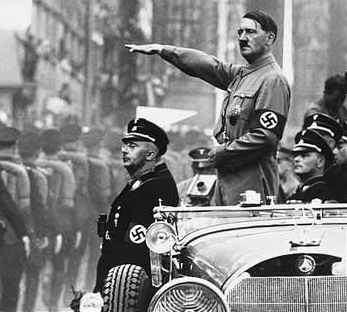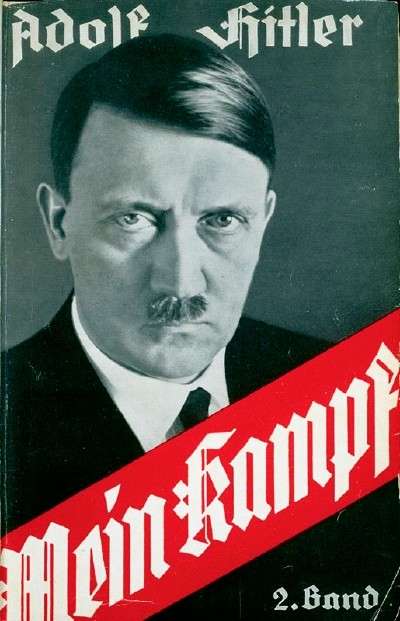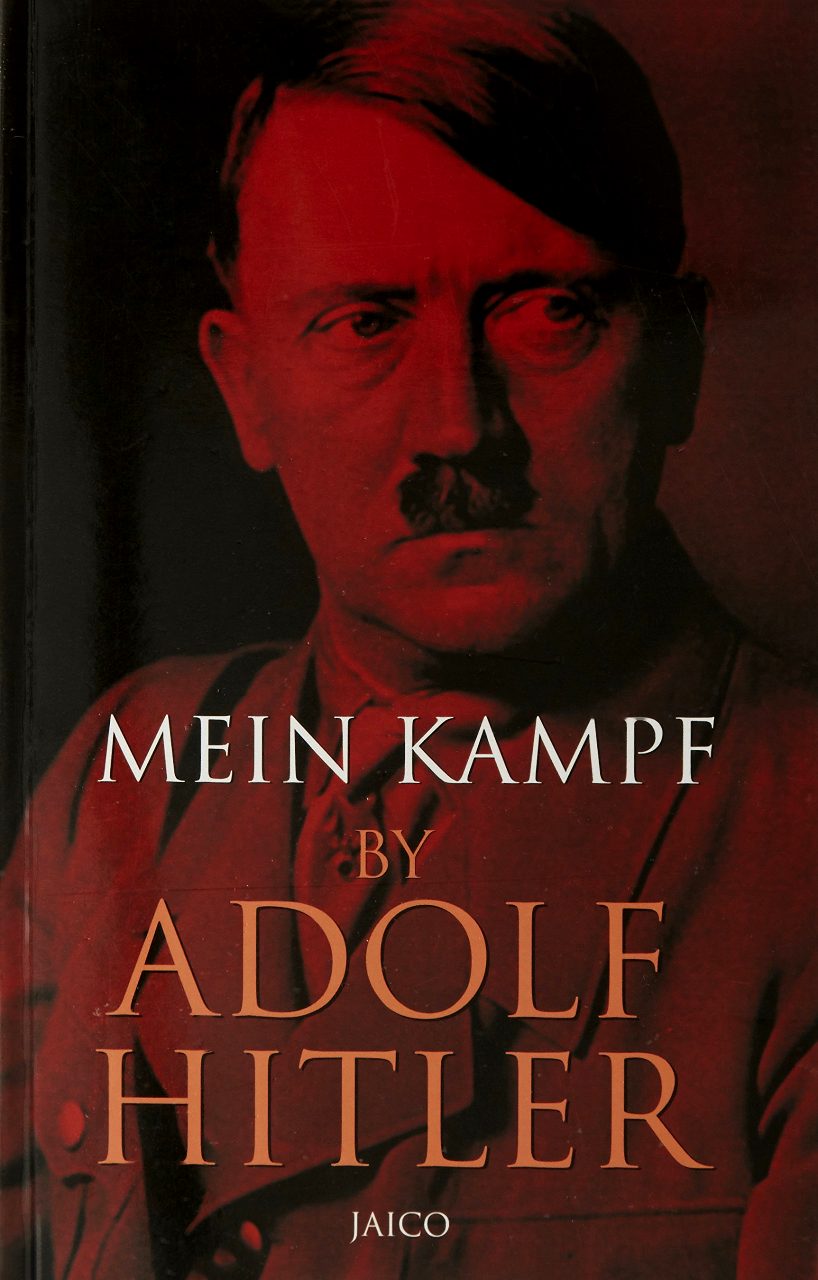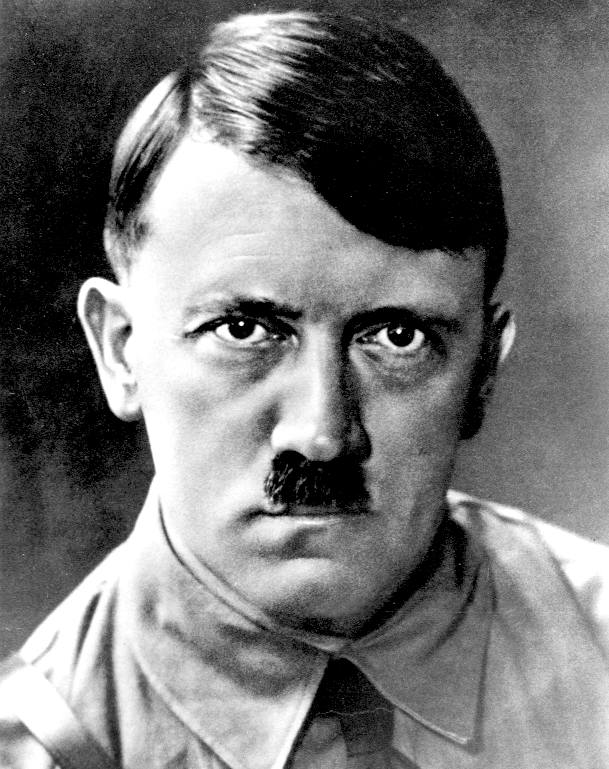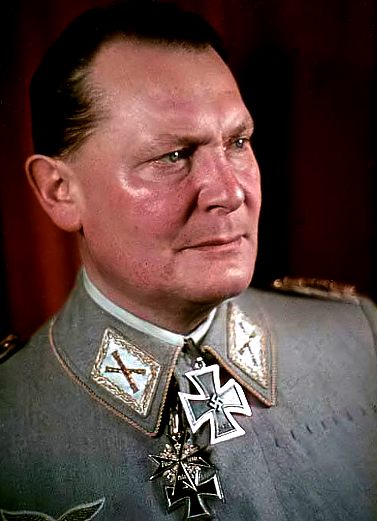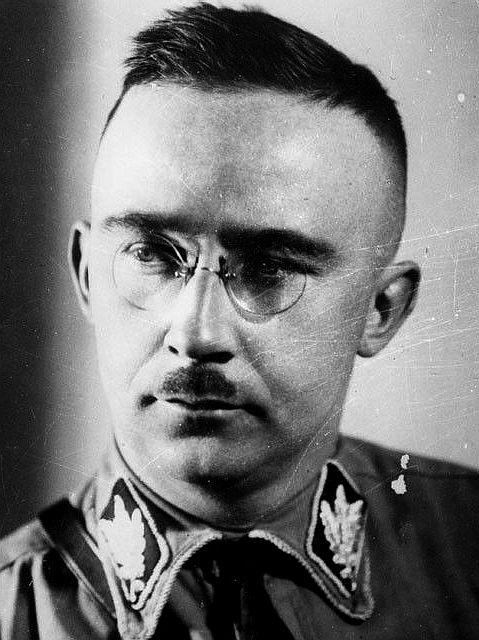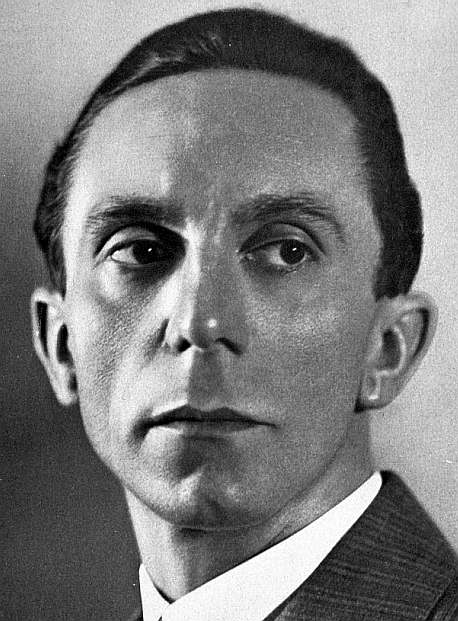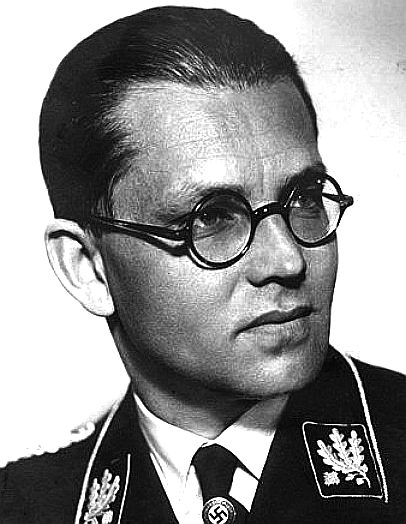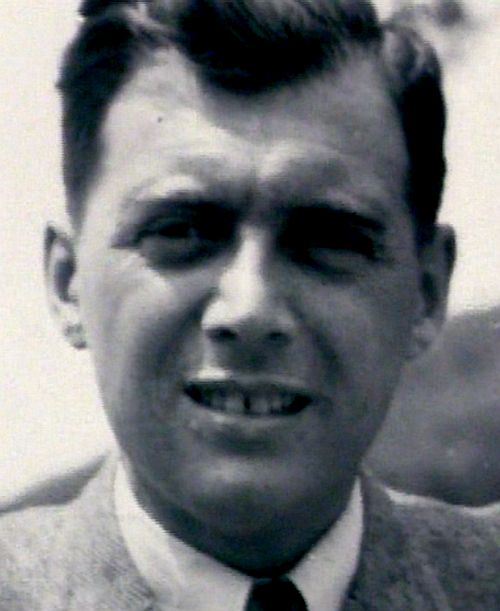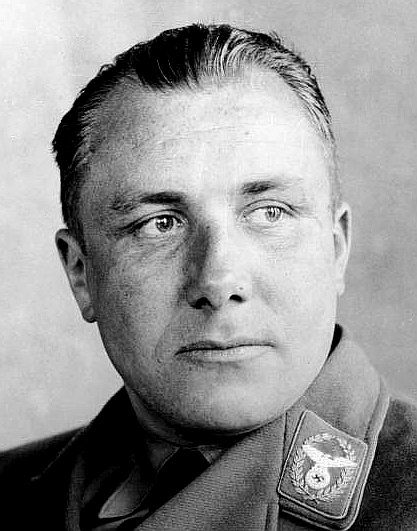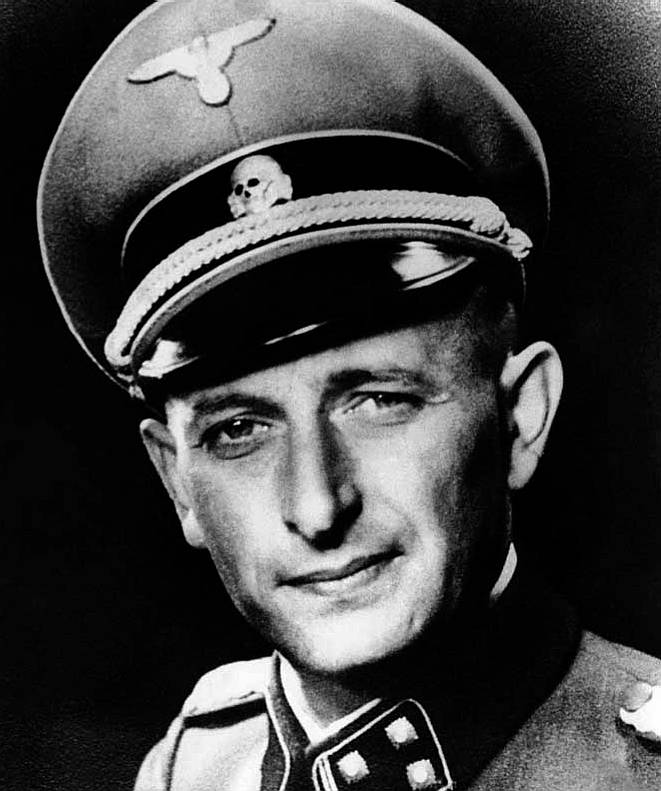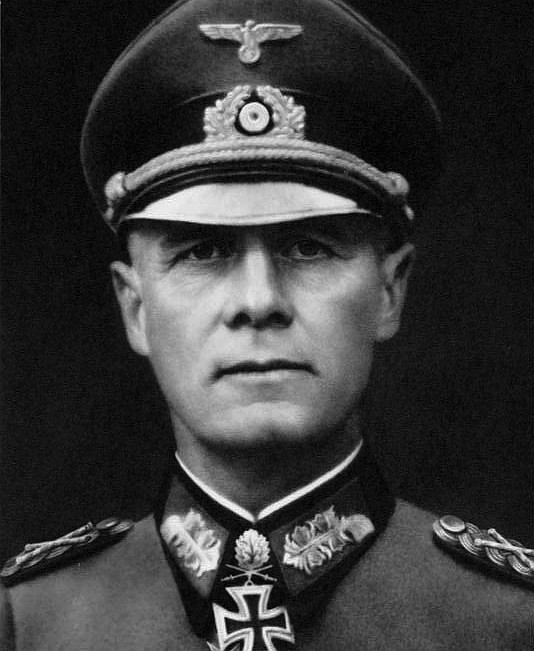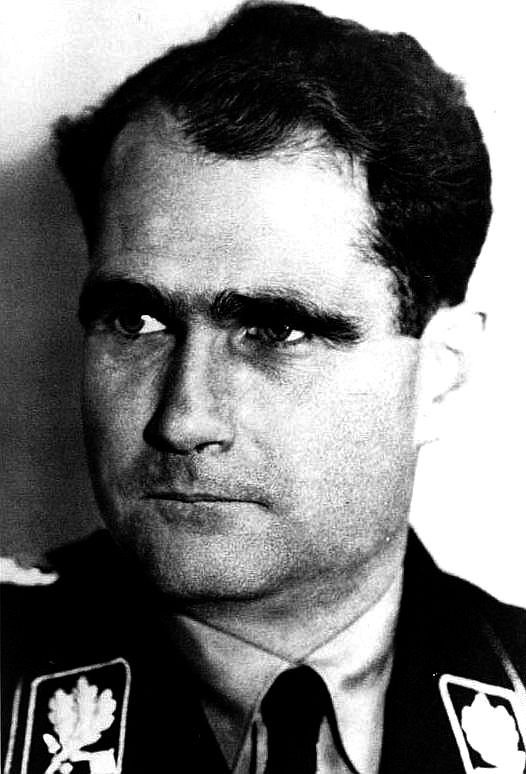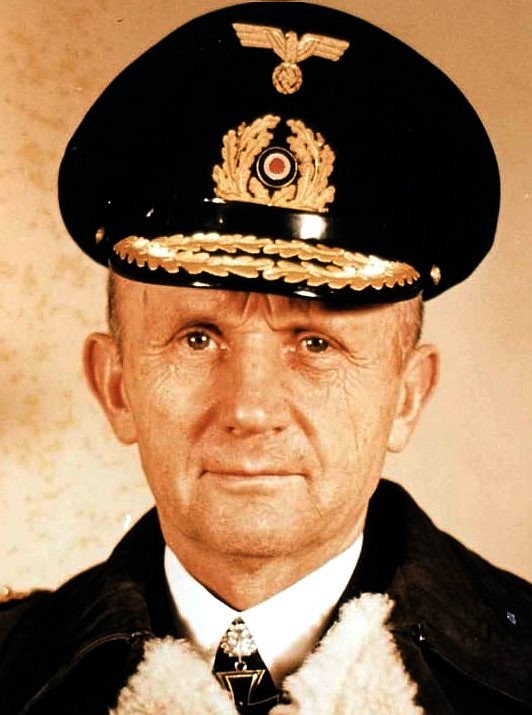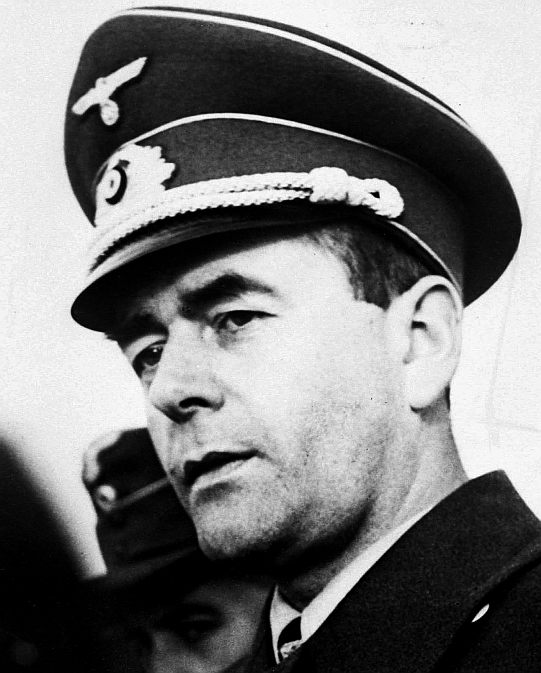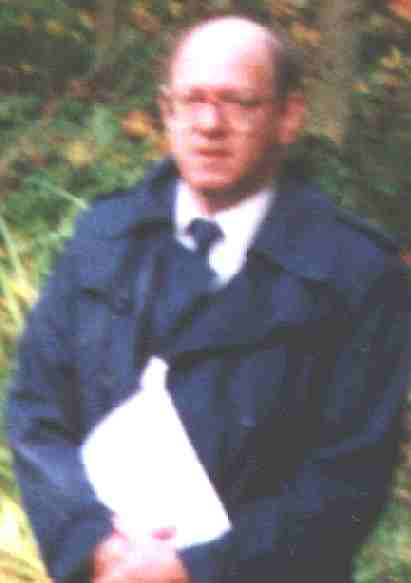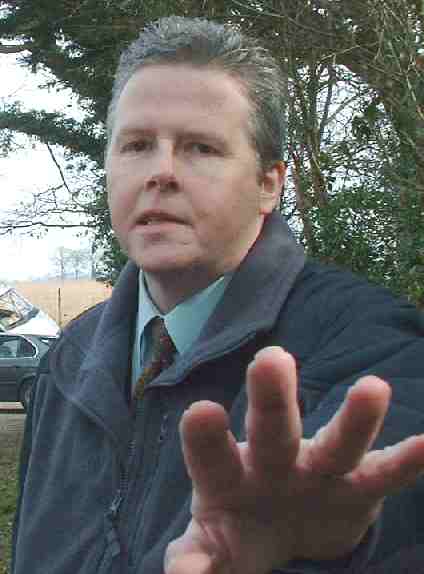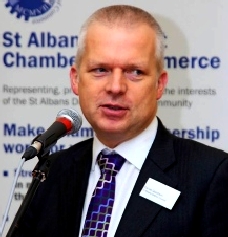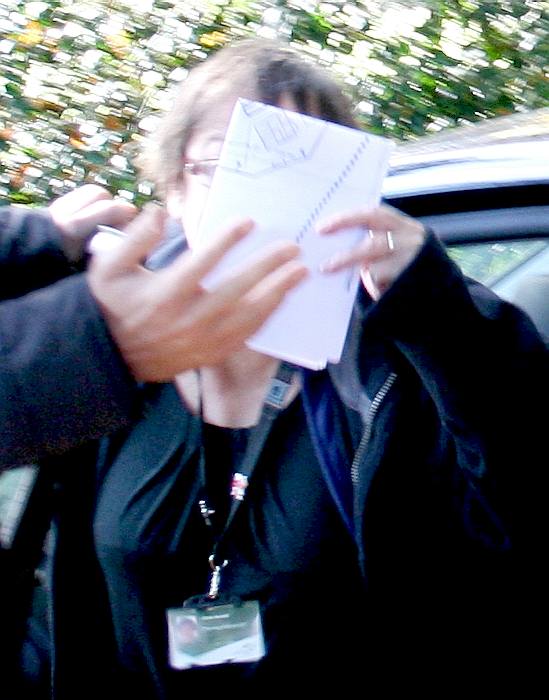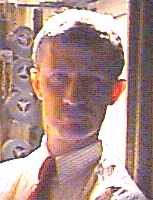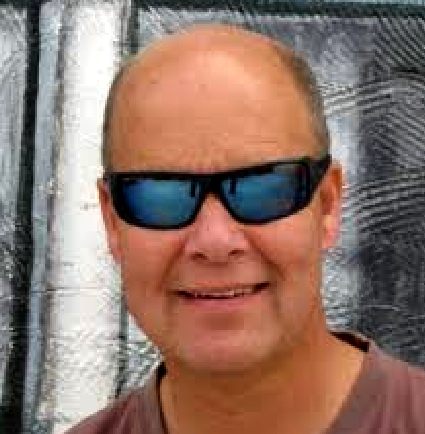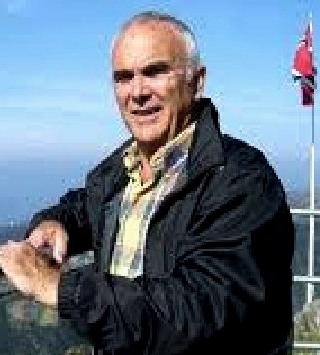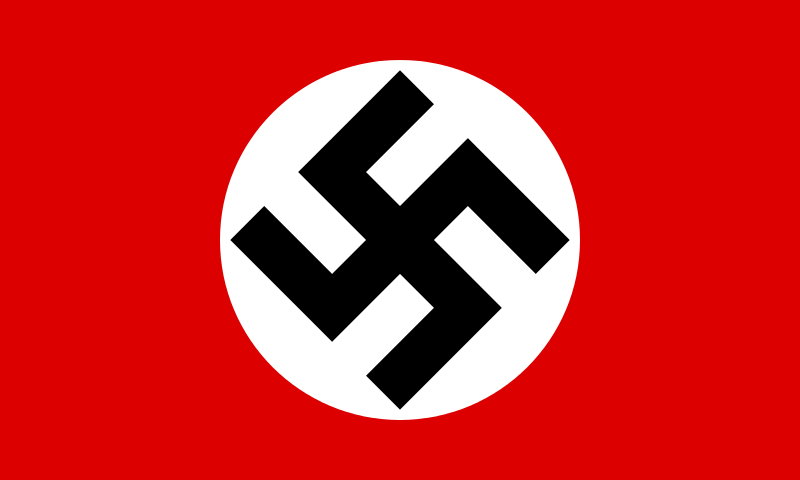|
ADOLF HITLER
HOME | CASE STUDIES | HISTORY | LAW | POLITICS | RIGHTS | SITE INDEX |
|||||||||||||||
|
The avatar of fascism posed the century's greatest threat to democracy and redefined the meaning of evil forever
Adolf Hitler and chum Heinrich Himmler [Allegedly, Adolf Hitler did not die in that bunker incident C.1949. Apparently, he was fired into England, strapped to a V1 rocket, leaving behind his false teeth. He parachuted into Wealden that night hoping to meet some deviants, who'd arranged a new identity for their fallen comrade. Apparently, he landed in Crowborough, shaved off his moustache and was mistaken for a council official. Job done.]
What was the secret of his power over his listeners? His demagogic appeal to immoderation, to excess and to simplifying hate? They spoke of his intuitive powers and his "luck" (he escaped several attempts on his life).
Adolf Hitler or the incarnation of absolute evil; this is how future generations will remember the all-powerful Fuehrer of the criminal Third Reich. Compared with him, his peers Mussolini and Franco were novices. Under his hypnotic gaze, humanity crossed a threshold from which one could see the abyss.
At the same time that he terrorized his adversaries, he knew how to please, impress and charm the very interlocutors from whom he wanted support. Diplomats and journalists insist as much on his charm as they do on his temper tantrums. The savior admired by his own as he dragged them into his madness, the Satan and exterminating angel feared and hated by all others, Hitler led his people to a shameful defeat without precedent. That his political and strategic ambitions have created a dividing line in the history of this turbulent and tormented century is undeniable: there is a before and an after. By the breadth of his crimes, which have attained a quasi-ontological dimension, he surpasses all his predecessors: as a result of Hitler, man is defined by what makes him inhuman. With Hitler at the head of a gigantic laboratory, life itself seems to have changed.
If all this seems rather like the inner workings of your local authority, then we have struck a chord. When faced with criticism or found to have done wrong, council's tend to stonewall. As the pressure mounts, they try to crush complainants, avoid giving persons their right to a fair hearing. All thins considered, what is the difference between the way your council treat you and the way the Gestapo operated under Heinrich Himmler?
Founder and leader of the Nazi Party, Reich Chancellor and guiding spirit of the Third Reich from 1933 to 1945, Head of State and Supreme Commander of the Armed Forces, Adolf Hitler was born in Braunau am Inn, Austria, on 20 April 1889. The son of a fifty-two-year-old Austrian customs official, Alois Schickelgruber Hitler, and his third wife, a young peasant girl, Klara Poelzl, both from the backwoods of lower Austria, the young Hitler was a resentful, discontented child. Moody, lazy, of unstable temperament, he was deeply hostile towards his strict, authoritarian father and strongly attached to his indulgent, hard-working mother, whose death from cancer in December 1908 was a shattering blow to the adolescent Hitler.
After spending four years in the Realschule in Linz, he left school at the age of sixteen with dreams of becoming a painter. In October 1907, the provincial, middle-class boy left home for Vienna, where he was to remain until 1913 leading a bohemian, vagabond existence. Embittered at his rejection by the Viennese Academy of Fine Arts, he was to spend "five years of misery and woe" in Vienna as he later recalled, adopting a view of life which changed very little in the ensuing years, shaped as it was by a pathological hatred of Jews and Marxists, liberalism and the cosmopolitan Habsburg monarchy.
Existing from hand to mouth on occasional odd jobs and the hawking of sketches in low taverns, the young Hitler compensated for the frustrations of a lonely bachelor's life in miserable male hostels by political harangues in cheap cafes to anyone who would listen and indulging in grandiose dreams of a Greater Germany.
In Vienna he acquired his first education in politics by studying the demagogic techniques of the popular Christian-social Mayor, Karl Lueger, and picked up the stereotyped, obsessive anti-Semitism with its brutal, violent sexual connotations and concern with the "purity of blood" that remained with him to the end of his career. From crackpot racial theorists like the defrocked monk, Lanz von Liebenfels, and the Austrian Pan-German leader, Georg von Schoenerer, the young Hitler learned to discern in the "Eternal Jew" the symbol and cause of all chaos, corruption and destruction in culture, politics and the economy. The press, prostitution, syphilis, capitalism, Marxism, democracy and pacifism--all were so many means which "the Jew" exploited in his conspiracy to undermine the German nation and the purity of the creative Aryan race.
In May 1913 Hitler left Vienna for Munich and, when war broke out in August 1914, he joined the Sixteenth Bavarian Infantry Regiment, serving as a despatch runner. Hitler proved an able, courageous soldier, receiving the Iron Cross (First Class) for bravery, but did not rise above the rank of Lance Corporal. Twice wounded, he was badly gassed four weeks before the end of the war and spent three months recuperating in a hospital in Pomerania. Temporarily blinded and driven to impotent rage by the abortive November 1918 revolution in Germany as well as the military defeat, Hitler, once restored, was convinced that fate had chosen him to rescue a humiliated nation from the shackles of the Versailles Treaty, from Bolsheviks and Jews.
Assigned by the Reichswehr in the summer of 1919 to "educational" duties which consisted largely of spying on political parties in the overheated atmosphere of post-revolutionary Munich, Hitler was sent to investigate a small nationalistic group of idealists, the German Workers' Party. On 16 September 1919 he entered the Party (which had approximately forty members), soon changed its name to the National Socialist German Workers' Party (NSDAP) and had imposed himself as its Chairman by July 1921.
Hitler discovered a powerful talent for oratory as well as giving the new Party its symbol — the swastika — and its greeting "Heil!." His hoarse, grating voice, for all the bombastic, humourless, histrionic content of his speeches, dominated audiences by dint of his tone of impassioned conviction and gift for self-dramatization. By November 1921 Hitler was recognized as Fuhrer of a movement which had 3,000 members, and boosted his personal power by organizing strong- arm squads to keep order at his meetings and break up those of his opponents. Out of these squads grew the storm troopers (SA) organized by Captain Ernst Röhm and Hitler's black-shirted personal bodyguard, the Schutzstaffel (SS).
Hitler focused his propaganda against the Versailles Treaty, the "November criminals," the Marxists and the visible, internal enemy No. 1, the "Jew," who was responsible for all Germany's domestic problems. In the twenty-five-point programme of the NSDAP announced on 24 February 1920, the exclusion of the Jews from the Volk community, the myth of Aryan race supremacy and extreme nationalism were combined with "socialistic" ideas of profit-sharing and nationalization inspired by ideologues like Gottfried Feder. Hitler's first written utterance on political questions dating from this period emphasized that what he called "the anti-Semitism of reason" must lead "to the systematic combating and elimination of Jewish privileges. Its ultimate goal must implacably be the total removal of the Jews."
By November 1923 Hitler was convinced that the Weimar Republic was on the verge of collapse and, together with General Ludendorff and local nationalist groups, sought to overthrow the Bavarian government in Munich. Bursting into a beer-hall in Munich and firing his pistol into the ceiling, he shouted out that he was heading a new provisional government which would carry through a revolution against "Red Berlin." Hitler and Ludendorff then marched through Munich at the head of 3,000 men, only to be met by police fire which left sixteen dead and brought the attempted putsch to an ignominious end. Hitler was arrested and tried on 26 February 1924, succeeding in turning the tables on his accusers with a confident, propagandist speech which ended with the prophecy: "Pronounce us guilty a thousand times over: the goddess of the eternal court of history will smile and tear to pieces the State Prosecutor's submission and the court's verdict for she acquits us." Sentenced to five years' imprisonment in Landsberg fortress, Hitler was released after only nine months during which he dictated Mein Kampf (My Struggle) to his loyal follower, Rudolf Hess. Subsequently the "bible" of the Nazi Party, this crude, half-baked hotchpotch of primitive Social Darwinism, racial myth, anti-Semitism and lebensraum fantasy had sold over five million copies by 1939 and been translated into eleven languages.
The failure of the Beer-Hall putsch and his period of imprisonment transformed Hitler from an incompetent adventurer into a shrewd political tactician, who henceforth decided that he would never again confront the gun barrels of army and police until they were under his command. He concluded that the road to power lay not through force alone but through legal subversion of the Weimar Constitution, the building of a mass movement and the combination of parliamentary strength with extra-parliamentary street terror and intimidation. Helped by Goering and Goebbels he began to reassemble his followers and rebuild the movement which had disintegrated in his absence.
In January 1925 the ban on the Nazi Party was removed and Hitler regained permission to speak in public. Outmaneuvering the "socialist" North German wing of the Party under Gregor Strasser, Hitler re-established himself in 1926 as the ultimate arbiter to whom all factions appealed in an ideologically and socially heterogeneous movement. Avoiding rigid, programmatic definitions of National Socialism which would have undermined the charismatic nature of his legitimacy and his claim to absolute leadership, Hitler succeeded in extending his appeal beyond Bavaria and attracting both Right and Left to his movement.
Though the Nazi Party won only twelve seats in the 1928 elections, the onset of the Great Depression with its devastating effects on the middle classes helped Hitler to win over all those strata in German society who felt their economic existence was threatened. In addition to peasants, artisans, craftsmen, traders, small businessmen, ex-officers, students and declasse intellectuals, the Nazis in 1929 began to win over the big industrialists, nationalist conservatives and army circles. With the backing of the press tycoon, Alfred Hugenberg, Hitler received a tremendous nationwide exposure just as the effects of the world economic crisis hit Germany, producing mass unemployment, social dissolution, fear and indignation. With demagogic virtuosity, Hitler played on national resentments, feelings of revolt and the desire for strong leadership using all the most modern techniques of mass persuasion to present himself as Germany's redeemer and messianic saviour.
In the 1930 elections the Nazi vote jumped dramatically from 810,000 to 6,409,000 (18.3 percent of the total vote) and they received 107 seats in the Reichstag. Prompted by Hjalmar Schacht and Fritz Thyssen, the great industrial magnates began to contribute liberally to the coffers of the NSDAP, reassured by Hitler's performance before the Industrial Club in Dusseldorf on 27 January 1932 that they had nothing to fear from the radicals in the Party. The following month Hitler officially acquired German citizenship and decided to run for the Presidency, receiving 13,418,011 votes in the run-off elections of 10 April 1931 as against 19,359,650 votes for the victorious von Hindenburg , but four times the vote for the communist candidate, Ernst Thaelmann. In the Reichstag elections of July 1932 the Nazis emerged as the largest political party in Germany, obtaining nearly fourteen million votes (37.3 per cent) and 230 seats. Although the NSDAP fell back in November 1932 to eleven million votes (196 seats), Hitler was helped to power by a camarilla of conservative politicians led by Franz von Papen, who persuaded the reluctant von Hindenburg to nominate "the Bohemian corporal" as Reich Chancellor on 30 January 1933.
Once in the saddle, Hitler moved with great speed to outmanoeuvre his rivals, virtually ousting the conservatives from any real participation in government by July 1933, abolishing the free trade unions, eliminating the communists, Social Democrats and Jews from any role in political life and sweeping opponents into concentration camps. The Reichstag fire of 27 February 1933 had provided him with the perfect pretext to begin consolidating the foundations of a totalitarian one-party State, and special "enabling laws" were ramrodded through the Reichstag to legalize the regime's intimidatory tactics.
With support from the nationalists, Hitler gained a majority at the last "democratic" elections held in Germany on 5 March 1933 and with cynical skill he used the whole gamut of persuasion, propaganda, terror and intimidation to secure his hold on power. The seductive notions of "National Awakening" and a "Legal Revolution" helped paralyse potential opposition and disguise the reality of autocratic power behind a facade of traditional institutions.
The destruction of the radical SA leadership under Ernst Rohm in the Blood Purge of June 1934 confirmed Hitler as undisputed dictator of the Third Reich and by the beginning of August, when he united the positions of Fuhrer and Chancellor on the death of von Hindenburg, he had all the powers of State in his hands. Avoiding any institutionalization of authority and status which could challenge his own undisputed position as supreme arbiter, Hitler allowed subordinates like Himmler, Goering and Goebbels to mark out their own domains of arbitrary power while multiplying and duplicating offices to a bewildering degree.
During the next four years Hitler enjoyed a dazzling string of domestic and international successes, outwitting rival political leaders abroad just as he had defeated his opposition at home. In 1935 he abandoned the Versailles Treaty and began to build up the army by conscripting five times its permitted number. He persuaded Great Britain to allow an increase in the naval building programme and in March 1936 he occupied the demilitarized Rhineland without meeting opposition. He began building up the Luftwaffe and supplied military aid to Francoist forces in Spain, which brought about the Spanish fascist victory in 1939.
The German rearmament programme led to full employment and an unrestrained expansion of production, which reinforced by his foreign policy successes--the Rome-Berlin pact of 1936, the Anschluss with Austria and the "liberation" of the Sudeten Germans in 1938 — brought Hitler to the zenith of his popularity. In February 1938 he dismissed sixteen senior generals and took personal command of the armed forces, thus ensuring that he would be able to implement his aggressive designs.
Hitler's saber-rattling tactics bludgeoned the British and French into the humiliating Munich agreement of 1938 and the eventual dismantlement of the Czechoslovakian State in March 1939. The concentration camps, the Nuremberg racial laws against the Jews, the persecution of the churches and political dissidents were forgotten by many Germans in the euphoria of Hitler's territorial expansion and bloodless victories. The next designated target for Hitler's ambitions was Poland (her independence guaranteed by Britain and France) and, to avoid a two-front war, the Nazi dictator signed a pact of friendship and non-aggression with Soviet Russia. On 1 September 1939 German armies invaded Poland and henceforth his main energies were devoted to the conduct of a war he had unleashed to dominate Europe and secure Germany's "living space."
The first phase of World War II was dominated by German Blitzkrieg tactics: sudden shock attacks against airfields, communications, military installations, using fast mobile armor and infantry to follow up on the first wave of bomber and fighter aircraft. Poland was overrun in less than one month, Denmark and Norway in two months, Holland, Belgium, Luxemburg and France in six weeks. After the fall of France in June 1940 only Great Britain stood firm.
The Battle of Britain, in which the Royal Air Force prevented the Luftwaffe from securing aerial control over the English Channel, was Hitler's first setback, causing the planned invasion of the British Isles to be postponed. Hitler turned to the Balkans and North Africa where his Italian allies had suffered defeats, his armies rapidly overrunning Greece, Yugoslavia, the island of Crete and driving the British from Cyrenaica.
The crucial decision of his career, the invasion of Soviet Russia on June 22, 1941, was rationalized by the idea that its destruction would prevent Great Britain from continuing the war with any prospect of success. He was convinced that once he kicked the door in, as he told Jodl (q.v.), "the whole rotten edifice [of communist rule] will come tumbling down" and the campaign would be over in six weeks. The war against Russia was to be an anti-Bolshivek crusade, a war of annihilation in which the fate of European Jewry would finally be sealed. At the end of January 1939 Hitler had prophesied that "if the international financial Jewry within and outside Europe should succeed once more in dragging the nations into a war, the result will be, not the Bolshevization of the world and thereby the victory of Jewry, but the annihilation of the Jewish race in Europe."
As the war widened — the United States by the end of 1941 had entered the struggle against the Axis powers — Hitler identified the totality of Germany's enemies with "international Jewry," who supposedly stood behind the British-American-Soviet alliance. The policy of forced emigration had manifestly failed to remove the Jews from Germany's expanded lebensraum, increasing their numbers under German rule as the Wehrmacht moved East.
The widening of the conflict into a world war by the end of 1941, the refusal of the British to accept Germany's right to continental European hegemony (which Hitler attributed to "Jewish" influence) and to agree to his "peace" terms, the racial-ideological nature of the assault on Soviet Russia, finally drove Hitler to implement the "Final Solution of the Jewish Question" which had been under consideration since 1939. The measures already taken in those regions of Poland annexed to the Reich against Jews (and Poles) indicated the genocidal implications of Nazi-style "Germanization" policies. The invasion of Soviet Russia was to set the seal on Hitler's notion of territorial conquest in the East, which was inextricably linked with annihilating the 'biological roots of Bolshevism' and hence with the liquidation of all Jews under German rule.
At first the German armies carried all before them, overrunning vast territories, overwhelming the Red Army, encircling Leningrad and reaching within striking distance of Moscow. Within a few months of the invasion Hitler's armies had extended the Third Reich from the Atlantic to the Caucasus, from the Baltic to the Black Sea. But the Soviet Union did not collapse as expected and Hitler, instead of concentrating his attack on Moscow, ordered a pincer movement around Kiev to seize the Ukraine, increasingly procrastinating and changing his mind about objectives. Underestimating the depth of military reserves on which the Russians could call, the caliber of their generals and the resilient, fighting spirit of the Russian people (whom he dismissed as inferior peasants), Hitler prematurely proclaimed in October 1941 that the Soviet Union had been "struck down and would never rise again." In reality he had overlooked the pitiless Russian winter to which his own troops were now condemned and which forced the Wehrmacht to abandon the highly mobile warfare which had previously brought such spectacular successes.
The disaster before Moscow in December 1941 led him to dismiss his Commander-in-Chief von Brauchitsch, and many other key commanders who sought permission for tactical withdrawals, including Guderian, Bock, Hoepner, von Rundstedt and Leeb, found themselves cashiered. Hitler now assumed personal control of all military operations, refusing to listen to advice, disregarding unpalatable facts and rejecting everything that did not fit into his preconceived picture of reality. His neglect of the Mediterranean theatre and the Middle East, the failure of the Italians, the entry of the United States into the war, and above all the stubborn determination of the Russians, pushed Hitler on to the defensive. From the winter of 1941 the writing was on the wall but Hitler refused to countenance military defeat, believing that implacable will and the rigid refusal to abandon positions could make up for inferior resources and the lack of a sound overall strategy.
Convinced that his own General Staff was weak and indecisive, if not openly treacherous, Hitler became more prone to outbursts of blind, hysterical fury towards his generals, when he did not retreat into bouts of misanthropic brooding. His health, too, deteriorated under the impact of the drugs prescribed by his quack physician, Dr. Theodor Morell. Hitler's personal decline, symbolized by his increasingly rare public appearances and his self-enforced isolation in the "Wolf's Lair," his headquarters buried deep in the East Prussian forests, coincided with the visible signs of the coming German defeat which became apparent in mid-1942.
Rommel's defeat at El Alamein and the subsequent loss of North Africa to the Anglo-American forces were overshadowed by the disaster at Stalingrad where General von Paulus's Sixth Army was cut off and surrendered to the Russians in January 1943. In July 1943 the Allies captured Sicily and Mussolini's regime collapsed in Italy. In September the Italians signed an armistice and the Allies landed at Salerno, reaching Naples on 1 October and taking Rome on June 4, 1944. The Allied invasion of Normandy followed on June 6, 1944 and soon a million Allied troops were driving the German armies eastwards, while from the opposite direction the Soviet forces advanced relentlessly on the Reich. The total mobilization of the German war economy under Albert Speer and the energetic propaganda efforts of Joseph Goebbels to rouse the fighting spirit of the German people were impotent to change the fact that the Third Reich lacked the resources equal to a struggle against the world alliance which Hitler himself had provoked.
Allied bombing began to have a telling effect on German industrial production and to undermine the morale of the population. The generals, frustrated by Hitler's total refusal to trust them in the field and recognizing the inevitability of defeat, planned, together with the small anti-Nazi Resistance inside the Reich, to assassinate the Fuhrer on 20 July 1944, hoping to pave the way for a negotiated peace with the Allies that would save Germany from destruction. The plot failed and Hitler took implacable vengeance on the conspirators, watching with satisfaction a film of the grisly executions carried out on his orders.
As disaster came closer, Hitler buried himself in the unreal world of the Fuhrerbunker in Berlin, clutching at fantastic hopes that his "secret weapons," the V-1 and V-2 rockets, would yet turn the tide of war. He gestured wildly over maps, planned and directed attacks with non-existent armies and indulged in endless, night-long monologues which reflected his growing senility, misanthropy and contempt for the "cowardly failure" of the German people.
As the Red Army approached Berlin and the Anglo-Americans reached the Elbe, on 19 March 1945 Hitler ordered the destruction of what remained of German industry, communications and transport systems. He was resolved that, if he did not survive, Germany too should be destroyed. The same ruthless nihilism and passion for destruction which had led to the extermination of six million Jews in death camps, to the biological "cleansing" of the sub-human Slavs and other subject peoples in the New Order, was finally turned on his own people.
On April 29, 1945, he married his mistress Eva Braun and dictated his final political testament, concluding with the same monotonous, obsessive fixation that had guided his career from the beginning: "Above all I charge the leaders of the nation and those under them to scrupulous observance of the laws of race and to merciless opposition to the universal poisoner of all peoples, international Jewry."
The following day Hitler committed suicide, shooting himself through the mouth with a pistol. His body was carried into the garden of the Reich Chancellery by aides, covered with petrol and burned along with that of Eva Braun. This final, macabre act of self-destruction appropriately symbolized the career of a political leader whose main legacy to Europe was the ruin of its civilization and the senseless sacrifice of human life for the sake of power and his own commitment to the bestial nonsense of National Socialist race mythology. With his death nothing was left of the "Greater Germanic Reich," of the tyrannical power structure and ideological system which had devastated Europe during the twelve years of his totalitarian rule.
Ultimately, the ignominious demise of one of the world's evil dictators will be the end of all corrupt councils, provided the public keep up the pressure and demand an end to the Gestapo tactics employed by planning departments the length and breadth of the country.
David
Ben-Gurion
AMAZON COMMENT - My Struggle is a book that few people will want to read. This is because it was written by one of the most reviled men in history and because of the way it was written. The impression of Hitler from films and World War II books is simply a negative one: An evil war mongerer responsible for the deaths of millions. Reading his own book is intriguing and this is part of its relatively small appeal. In a similar way that classic books (e.g. Anna Karenina/Dead Souls) begin, after the first few pages you realise you are reading something created by an exceptional mind. However this book is not a beautiful story. This is not like a magazine article tackling a hard subject with little time which gives the astute reader the impression that he or she knows more about the subject than the writer. The first book `A Reckoning is partially a story of Hitler s life, World War One and much of his theories and philosophy. You enter into a strange world of paragraph long sentences, repetition, constantly twisting and turning. Hitler has a go at politicians, policies, parasites etc. and in a classic way is blind to the concept that his ideas might be as blinkered as those he attacks. He believes anything miserable, weak or cowardly must be eradicated, having no compassion or pity for anything that does not conform to his ideals. Hatred is a large part of this book. This book has more hatred in it than a quarter of a mile long oil tanker has oil. There is hatred for Jews, hatred against anyone who is not ulta-nationalistic or anyone not German. The author gives the impression that if the whole world were wiped out except for Germany this in itself would not be a bad thing - By A Customer on 22 Mar. 2006
LINKS & REFERENCE
Remains of the early warning radar stations at Wartling and Pevensey
FAIR USE NOTICE
This site contains copyrighted material the use of which has not always been specifically authorized by the copyright owner. We are making such material available in our efforts to advance understanding of environmental, political, human rights, economic, scientific, and social justice issues, etc. We believe this constitutes a 'fair use' of any such copyrighted material as provided for in section 107 of the US Copyright Law. In accordance with Title 17 U.S.C. Section 107, the material on this site is distributed without profit to those who have expressed a prior interest in receiving the included information for research and educational purposes.
With thanks to the Wealden Action Group and other Action Groups across the country for the supply of real case history and supporting documents.
*THAT THE PUBLIC MAY KNOW*
Victorio Scarpa, David Whibley, Julian Black, Daniel Goodwin, Christine Arnold
Christine Nuttall, David Phillips, Douglas Moss, Ian Kay, Charles Lant
Abbott Trevor - Alcock Charmain - Ditto - Arnold Chris (Christine) - Barakchizadeh Lesley - Paul Barker - Bending Christopher Black Julian - Boakes Beverley - Bradshaw Clifford - Brigginshaw Marina - Brown Ashley - Coffey Patrick - Douglas Sheelagh Dowsett Timothy - Flemming Mike - Forder Ralph - Garrett Martyn - Goodwin Daniel - Henham J - Holness Derek Hoy Thomas - Johnson Geoff - Kavanagh Geoff - Kay Ian - Kay I. M. - Barbara Kingsford - Lant Charles - Mercer Richard Mileman Niall - Moon Craig - Moss Douglas, J. - Nuttall Christine - Pettigrew Rex - Phillips David - Scarpa Victorio - Scott Trevor Kevin Stewart - Wakeford M. - Whibley David - White, George - Williams Kelvin - Wilson Kenneth - White Steve
|
|||||||||||||||
|
This site is free of © Copyright except where specifically stated 1997 - 2023. Any person may download, use and quote any reference or any link, and is guaranteed such right to freedom of information and speech under the Human Rights and Freedom of Information Acts. However, be aware that we cannot be held liable for the accuracy of the information provided. All users should therefore research matters for themselves and seek their own legal advice and this information is provided simply by way of a guide. Horse Sanctuary Trust UK All trademarks herby acknowledged. Contact Us.
|
